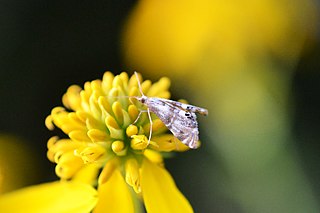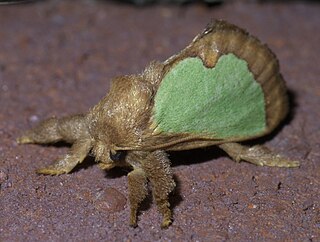
Mimallonidae Burmeister (mimallonids), sometimes known as "sack-bearer" moths for the larval case-building behavior, are a family of Lepidoptera containing over 300 named species in 43 genera. These moths are found only in the New World, with most taxa occurring in the Neotropics. Adult moths are externally similar to those belonging to some of the other Macroheterocera families Bombycoidea and Drepanoidea, and thus have been variously treated as belonging to either one of these or other superfamilies.

Cisthene is a genus of lichen moths in the family Erebidae. The genus was erected by Francis Walker in 1854.

Virbia is a genus of tiger moths in the family Erebidae. The genus was erected by Francis Walker in 1854.

Petrophila is a genus of moths of the family Crambidae. The genus was described by Lansdown Guilding in 1830.

Prosoparia is a genus of moths of the family Erebidae. The genus was erected by Augustus Radcliffe Grote in 1883.

Holochroa is a monotypic moth genus in the family Geometridae. Its only species, Holochroa dissociarius, is found in North America. The species was described by George Duryea Hulst in 1887 and he described the genus nine years later in 1896.

Mesothea is a monotypic moth genus in the family Geometridae described by Warren in 1901. Its only species, Mesothea incertata, the day emerald or plain emerald, was first described by Walker in 1863. It is found in North America.

Plataea is a genus of geometrid moths in the family Geometridae. There are about 11 described species in Plataea.
Pseudhapigia is a monotypic moth genus of the family Notodontidae. Its only species, Pseudhapigia brunnea, is found in North America including its type location in Guadalajara, Mexico. The genus and species were first described by William Schaus in 1901.
Notela is a monotypic moth genus of the family Notodontidae. Its only species, Notela jaliscana, is found in North America. Both the genus and species were first described by William Schaus in 1901

Apatelodes is a genus of moths of the family Apatelodidae first described by Packard in 1864.

Hydriomena irata is a species of geometrid moth in the family Geometridae. It is found in North America.

Lacosoma chiridota, the scalloped sack-bearer, is a species of sack-bearer moth in the family Mimallonidae.

Lithacodes is a genus of slug caterpillar moths in the family Limacodidae. There are about five described species in Lithacodes.

Lithariapteryx is a genus of sun moths in the family Heliodinidae. There are at least four described species in Lithariapteryx.

Mathildana is a genus of concealer moths in the family Oecophoridae. There are at least three described species in Mathildana.

Euclea is a genus of moths in the family Limacodidae. The genus was erected by Jacob Hübner in 1819. There are at least 40 described species in Euclea.

Tallula is a genus of pyralid moths in the family Pyralidae. There are about 11 described species in Tallula.
Lacosoma arizonicum, the southwestern sack-bearer moth, is a species of moth in the family Mimallonidae and one of four species of sack-bearers occurring north of Mexico. Its type locality is the Chiricahua Mountains of Arizona. The species was first described by Harrison Gray Dyar Jr. in 1898 from a single male specimen and has Hodges number 7660.
Astala is a genus of bagworm moths in the family Psychidae. There are about seven described species in Astala. Individuals of the astala genus often have a wingspan of 1,6-2 centimeters and a length of 0,7-1 centimeter.

















